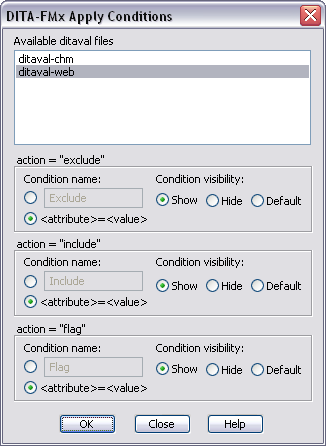Applies conditions to files based on the filtering properties defined in a ditaval file.
The Apply Ditaval as Conditions command can be used while authoring and for setting up PDFs that are generated through FrameMaker. If the command is run with a file active, the conditions will be applied to that file. If a book is active, the conditions will be applied to all files in that book.

In order to use this command you must have at least one ditaval file registered with DITA-FMx. A ditaval file is “registered” with DITA-FMx when you use the Ditaval Manager to create new ditaval files or add existing ditaval files to the drop-down list. When you run the Apply Ditaval as Conditions command, the dialog box lists the available ditaval files (those that have been registered), and the options for the ditaval action values (“exclude”, “include” and “flag”). The settings in the three “action=” areas define the condition name and the visibility of the conditions that are applied when a prop action attribute matches the specified type.
For each prop element in a ditaval file the action attribute specifies either to exclude, include, or flag elements with matching attributes and values. When a ditaval file is applied as conditions in a FrameMaker file, elements are matched based on the att and val attributes, and a named condition is applied to each element. In the Apply Conditions dialog you specify that the condition name is defined as a fixed string (such as “Exclude”, “Include” or “Flag”) or that it is defined based on a combination of the att and val attribute values. For example, given the following line from a ditaval file, if the condition name is defined by the att and val attributes, it would be “audience=admin.”
<prop att="audience" val="admin" action="exclude" />
The condition visibility options are Show, Hide, and Default. If set to Show or Hide, the conditions will be shown or hidden accordingly. However, if Default is selected, the condition visibility will be defined by the settings in the template assuming that the condition is already defined.